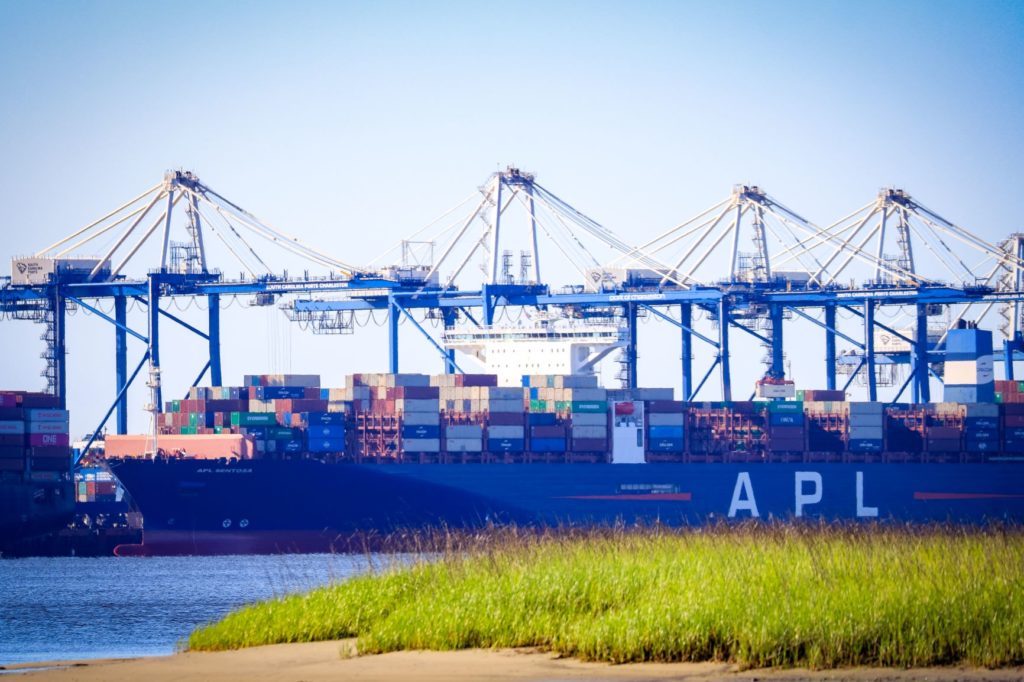S.C. Ports Authority worked three of the largest vessels to ever call on the Port of Charleston in April — the 13,200-TEU OOCL Chongqing, the 14,000-TEU Monaco Bridge and the 14,000-TEU APL Sentosa.

S.C. Ports handled 176,152 twenty-foot equivalent container units (TEUs) at the Wando Welch and North Charleston container terminals in April. The Port has handled 2 million TEUs thus far in fiscal year 2020, from July through April.
In April, S.C. Ports moved 100,810 pier containers, which measures the total number of boxes handled. This brings the fiscal-year-to-date total of pier containers to 1.13 million.
S.C. Ports handled 34,232 pier tons of breakbulk in April for a total of 575,893 pier tons thus far in fiscal year 2020, up about 14% from the year prior. The Columbus Street Terminal had 9,036 vehicles roll across its docks in April for a total of 183,131 vehicles fiscal-year-to-date, up 17% for fiscal year 2020.
S.C. Ports’ two inland ports had a combined total of 148,291 rail moves thus far in fiscal year 2020, up 8%. Inland Port Greer, located along Interstate 85 in Upstate South Carolina, reported 7,408 rail moves in April for a total of 121,198 rail moves thus far in fiscal year 2020, up 7.3%.
April marks two years since the opening of Inland Port Dillon, S.C. Ports’ newest inland port located along Interstate 95 near the North Carolina border. Inland Port Dillon had 2,586 rail moves in April for a total of 27,093 rail moves fiscal-year-to-date, up nearly 11%.
Overall, fiscal-year-to-date volumes remained steady compared to the same period in fiscal year 2019. However, April volumes were down year-over-year due to the temporary closure of automotive plants and the global disruption of supply chains as many stores and businesses halted operations in response to COVID-19.
S.C. Ports’ leadership shared their gratitude for the S.C. Ports team and the entire maritime community for their commitment to keeping freight moving during this time.
“As we face the challenges brought on by COVID-19, we continue to operate as we always have by offering excellent service and an unwavering spirit of collaboration,” S.C. Ports President and CEO Jim Newsome said. “Our S.C. Ports team is known for adaptability, creativity and teamwork, and this has been more evident now than ever. I want to extend a heartfelt thank you to all the essential maritime workers who work so hard every day to ensure vital goods are delivered to communities and businesses.”
“We have maintained our reliable operations and hours of service because the entire maritime community has done an amazing job keeping freight moving,” S.C. Ports COO Barbara Melvin said. “We say thank you to all our S.C. Ports teammates, tug boat operators, harbor pilots, longshoremen, clerks, mechanics, stevedores, motor carriers and truck drivers, ocean carriers and ship crews, warehouse workers, our contractors, and our agency partners, including the U.S. Coast Guard, U.S. Customs and Border Protection and the U.S. Army Corps of Engineers.”
Strength in fundamentals
The Southeast is the best place to be in the port business with a growing population to boost consumer goods imports, and a strong business base to strengthen imports and exports of raw materials and finished products.
S.C. Ports offers cargo owners access to markets, efficient operations, fast truck turn times and a dual-served intermodal rail network.
“We are a top 10 U.S. container port located in an incredibly strong market with great fundamentals,” Newsome said. “We remain focused on supporting our existing customers while recruiting new business to the market.”
S.C. Ports saw cargo volumes double over the past decade, in large part from the boom in advanced manufacturing throughout the Southeast. This expertise of moving goods just-in-time for global manufacturers sets the stage for the Port of Charleston to handle more goods for retailers.
S.C. Ports offers distribution center operators port access via a 950-acre, rail-served industrial site in Ridgeville, S.C.
Strength in infrastructure
S.C. Ports is on track to open the new Hugh K. Leatherman Terminal in North Charleston, S.C., in March 2021. Phase One will add about 700,000 TEUs of capacity to S.C. Ports.
Five new ship-to-shore cranes with 169 feet of lift height and 25 hybrid rubber-tiered gantry cranes will arrive later this year to outfit the first phase of the terminal. Phase One will have a 1,400-foot berth capable of handling a 19,000-TEU vessel.
The opening of the Hugh K. Leatherman Terminal will coincide with achieving a 52-foot depth in Charleston Harbor, greatly enhancing S.C. Ports’ big-ship capabilities.
“Ports are a long-term business requiring long-term assets. This makes our operations more resilient to economic fluctuations,” Newsome said. “The opening of the country’s newest container terminal will position us well to handle bigger ships and growing cargo volumes for decades to come.









